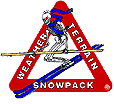[Click here to return to the page you came from!]
Avalanche Size
Also: Avalanche Class
In the US the five level scale is:
- Sluff: any slide running less than 50 meter slope distance regardless of other dimensions
- Small: relative to the path
- Medium: relative to the path
- Large: relative to the path
- Major or Maximum: relative to the path
These categories are in relation to path size, so a size or class number is not so meaningful without information on, or familiarity with, the path.
A reporting system used in Canada has the following size classifications:
| Size | Description | Typical Mass | Typical Length | Typical Impact Pressure |
| 1 | Relatively Harmless | Less than 10 tons | 10 meters | 1 kPa |
| 2 | Could bury, injure, or kill a person | 100 tons | 100 meters | 10 kPa |
| 3 | Could bury a car, destroy a small building, or break trees | 1000 tons | 1000 meters | 100 kPa |
| 4 | Could destroy a rail car | 10,000 tons | 2000 meters | 500 kPa |
| 5 | Largest known | 100,000 tons | 3000 meters | 1000 kPa |
Other systems have been proposed by Japanese and Swiss researchers, but have never come into use.
There is an international system which is based on morphological classification. It does not have categories that could lead to a term such as 'Class 3'. (Int Comm on Snow and Ice. 1981. 'Avalanche Atlas. Illustrated International Avalanche Classification.' Paris:UNESCO 265pp.)
This glossary is a work in progress and is made possible by AlpenPro.



